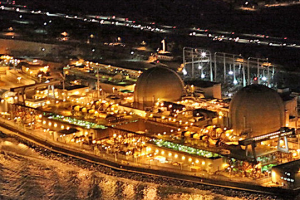
By Miriam Raftery
Photo: San Onofre nuclear facility, before its shutdown in 2013.
August 31, 2017 (San Diego) – Finding a safe place to store spent nuclear fuel from the shuttered San Onofre Nuclear Generating Stations is a daunting task. Yesterday, East County Magazine reported on a settlement reached between Citizens Oversight and Southern California Edison that aspires to move the radioactive waste away from the beach at San Onofre over the next couple of decades.
One of the proposed sites is in Arizona. But now officials at Arizona Public Services Company, which operates the Palo Verde Nuclear Generating Station west of Phoenix, say they won’t take California’s nuclear wastes.
Such a move would require approval from the U.S. Nuclear Regulatory Commission, APS says, but APS won’t be asking for that approval to store fuel from a reactor that’s not their own, AZ Central reports.
Ray Lutz, El Cajon resident and founder of Citizens Oversight, responded in an e-mail to ECM, “The Palo Verde plant sells quite a bit of power to California, so it is a bit unfair for them to sell power to California without also helping us with spent fuel problems.” He also questioned whether NRC approval is really necesary, since Edison is part owner of the Palo Verde facility.
The settlement’s goal is to reduce the risk of a nuclear catastrophe in densely populated California by eliminating nuclear waste storage just 100 feet or so from corrosive sea water in an area at high risk of earthquake and in a tsunami risk zone as well.
But late yesterday, Physicians for Social Responsibility-Los Angeles warned that the settlement deal “may dramatically increase health and security risks for communities in Southern California and the SouthWestern United States.”
The physicians group concludes that moving the radioactive fuel to a temporary and then permanent storage facility increases risks of a catastrophe through an accident or terrorist attack which could be “devastating,” said Denise Duffield, associate director of the organization.
The group agrees that Southern California Edison’s plan to bury waste on the beach is “inappropriate” given the risk of rising sea levels and the “daunting task of protecting it from terrorist attack in such an accessible location.”
Simply transferring such risk to people in other states is not the best solution, the doctors’ group argues, while noting that U.S. nuclear waste policy has been “broken for decades.”
Yucca Mountain in Nevada, long touted as a possible nuclear waste repository, has been found to be unsuitable due to water penetration that could lead to contamination of water supplies. Two other potential sites mentioned by the physicians’ group have been a “low level” radioactive waste site in Texas and another in new Mexico near the Waste Isolation Pilot Project that recently failed dramatically with an underground explosion and fire that “resulted in plutonium being released into the atmosphere,” the press release from the physicians’ group states.
The only “reasonable alternative” in the view of Physicians for Social Responsibility, would be an option also on the list proposed by Citizens Oversight. That option would be to move the nuclear waste to an inland location on Camp Pendleton where it would be safe from sea level rise, away from public access, and easier to protect against terrorism.
The settlement stemmed from a lawsuit filed by Citizens Oversight against the California Coastal Commission over its approval of a permit to store the dangerous wastes in underground containers near the shoreline at San Onofre.
Under the settlement, a plan must be established by 2035 including use of top experts in spent nuclear fuel transportation, nuclear engineering, spent fuel siting and licensing, radiation detective and monitoring to advise on proposed relocation. The deal also requires regular reporting and oversight.
There is no guarantee the waste will ultimately be moved, however, if no location can be found that is acceptable from environmental and health standpoints, as well as economic feasibility, transportation concerns, and regulatory approval.
Lutz, in a press statement yesterday, called the deal “a practical solution that respects safety.”
Later he told East County Magazine, “We will be working to solve this problem here rather than just ignoring it, like is being done everywhere else. This is an important step to take, even if we may not move the fuel instantly. This is not about moving it because of NIMBY concerns,” the long-time consumer activist makes clear. “We need to find the least damaging place for nuclear waste,” adding, “and 100 feet from the ocean, near earthquake faults, a major freeway and rail corridor, tsunami risks, and 8.4 million residents is not the best place."
Asked about the physician group’s objections, Lutz responded via email today, “They object to the whole deal but should actually support it because at this stage, we are only talking about trying to find alternative locations.”







Comments
Well..
..I would tell Arizona if they don't take our waste we will stop sending them rich Californians fleeing our messed up state.